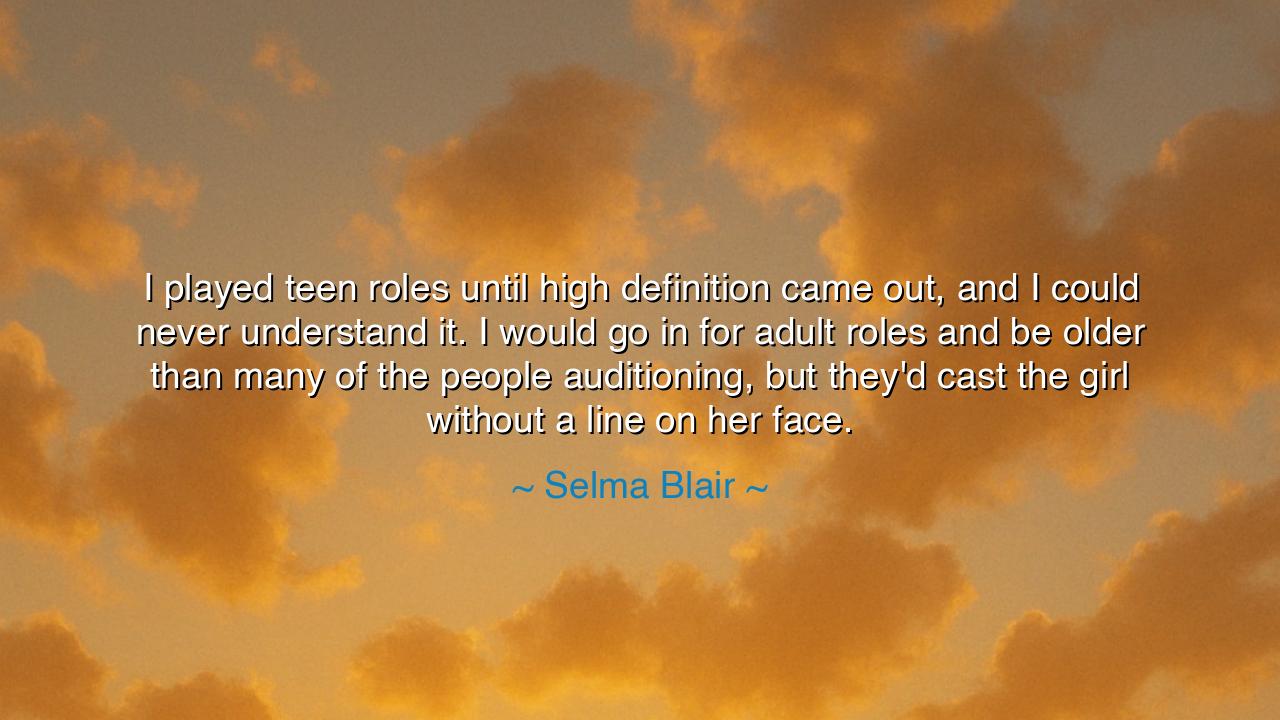
I played teen roles until high definition came out, and I could
I played teen roles until high definition came out, and I could never understand it. I would go in for adult roles and be older than many of the people auditioning, but they'd cast the girl without a line on her face.






Selma Blair once confessed with sharp honesty: "I played teen roles until high definition came out, and I could never understand it. I would go in for adult roles and be older than many of the people auditioning, but they'd cast the girl without a line on her face." In these words we hear the lament of an artist wrestling with the tyranny of image, the unrelenting demands of a culture that values youth above authenticity. Blair speaks not only of her own struggles in Hollywood but of a system that glorifies perfection while ignoring the richness of human truth.
The origin of her words lies in the strange paradox of her career. Blair had long played teen roles, even as she grew beyond those years in her real life. But with the advent of high-definition technology, every crease, every detail, every sign of age became magnified on the screen. Suddenly, casting directors sought only faces that betrayed no trace of time, and Blair, though seasoned and talented, found herself dismissed in favor of younger women with "not a line on their face." Her reflection reveals the cruel reality that in certain industries, especially entertainment, age becomes a mark not of wisdom but of disqualification.
This struggle is not hers alone but echoes throughout history. Consider Sarah Bernhardt, the great French actress of the 19th century, who continued to play ingénues well past the age society deemed appropriate. She defied critics, insisting that her craft, not her youth, defined her. Or think of Katharine Hepburn, who in her later years faced roles dwindling but refused to conform, instead reshaping the image of what an older actress could embody. Both, like Blair, confronted the world’s obsession with youthful appearances over seasoned artistry.
Blair’s words strike at the deeper truth of ageism—the fear and rejection of the natural process of growing older. In her story, we see how society often denies the dignity of maturity, demanding eternal youth as if it were the only form of beauty. Yet, in truth, the lines on the face are not blemishes but inscriptions of experience, the marks of laughter, grief, resilience, and wisdom. To erase them is to erase the record of a life lived fully.
Her statement also reminds us of the illusion of perfection. The entertainment industry, magnified by technology, often chases a fantasy: the flawless image, the unwrinkled skin, the eternal teenager. But life itself is not flawless. To insist on perfection in art is to deny the very humanity it seeks to portray. Blair’s frustration is thus not only about her own missed opportunities but about the loss of truth in storytelling. When only the wrinkle-free are chosen, the stories of age, struggle, and endurance are silenced.
For us, the lesson is profound: do not fear the marks of time, for they are the proof of your becoming. Whether in art, in work, or in life, resist the false idol of eternal youth. Value substance over surface, truth over illusion. And when you encounter others, do not judge them by the freshness of their appearance but by the depth of their spirit. To choose the face without a line is to choose a mask; to choose the seasoned soul is to choose truth.
Therefore, children of tomorrow, hear the wisdom hidden in Selma Blair’s lament. Let not the world’s shallow standards bind your worth. Know that your age is not your enemy but your witness, that your lines are not shame but story. And when you seek others—whether to cast them, to befriend them, or to love them—seek not those who look untouched by time, but those whose faces carry the light of experience. For in those lines, carved by years, dwell the true marks of beauty and the deepest treasures of humanity. Do not worship youth alone—honor the fullness of life.






AAdministratorAdministrator
Welcome, honored guests. Please leave a comment, we will respond soon